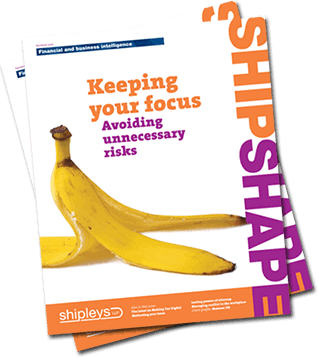The third in our series about how to get talking to new people
What do we want to talk about?
Usually, their business problems or challenges – where we may be able to help them. However, you can’t go straight in and ask about this as you won’t get the response you want, neither are you likely to build a good personal reputation. Instead you need to go through a number of steps.
Do I need a script?
No you don’t. And most people worry that something preplanned will sound like a script. The answer is to have something more like a toolkit, structure or framework to use that can be easily adapted. Then it reflects what you have learned about someone since meeting them or whilst preparing for the event, and your personal style.
Small talk and initial rapport building
We covered this last time in our last edition of Shipshape.
Their role
The main thing with this step is, without it turning into an interrogation, to find out about their work. Your focus is on being interested rather than trying to be interesting.
So typical questions are “What line of work are you in?” Or, “So, what do you do?” Using the answer as the building block for your next question is a really good technique. You might go on to ask “Really? How did you get into that?” or “How long have you been doing that”, and then “Sounds like it’s really busy – what do you enjoy the most?” Talking about things they like and their achievements is going to be easy for them and will put them at ease. At this early stage, asking about the challenges they face at work will come across as intrusive and rather rude – too much, too soon. You need to build up.
About their business
This stage is all about finding out about their role in the context of the business and, indirectly, whether you might become a supplier.
Good starting points are questions around size, location, and history. But then move on to ask about their customers – “So what sort of customers do you have – other business or individual consumers? …On line or on the high street?… Repeat or one off? How sensitive are customers to price changes?… Where do you get them from?” One I use all the time is “What does your ideal customer look like – just in case I can refer them to you!” This can work really well as it shows you are prepared to give something and to try to help.
In all these questions you are keeping away from confidential information – like the names of customers. That customer names may be given in the response is a different matter!
At every stage for the person you are talking to must not feel interrogated or that you are prying! This can be done by adapting how you ask:
1. Preface your question to soften its impact – for example “so”, “really”, “interesting” or “tell me”. Or precede them with a statement – “Well no job is perfect, but if you could change one thing in yours what would it be?”
2. Avoid specifics – ask about customers generally, not who they are. Enquire about the challenges facing the sector, not necessarily their company. The responses you get will cover both that business and the sector.
Business challenges
At this stage we are trying to find out about their problems or challenges – and where we might be able to help.
One of THE best questions here is “How’s business?” If used at this point you are likely to get a considered, informative and possibly revealing answer. The answer to the same question used as an opener – “Hello, my name is Rodney, pleased to meet you. How’s business” – is likely to be quite dismissive; “Fine, thank you”, or “really busy actually”. This is why you must go through the previous stages first.
My normal response to this question is “Pretty busy actually – but always looking for more”. If you listen out for this question you’ll be astonished at the number of people who give the impression they are far too busy with what’s already on their plate to even think about taking on something new. If that’s the case why are they at a networking event rather than getting on with and looking after the work they have? I digress!
Other questions that can work well at this point are: “So what’s on your agenda at the moment”, “So what’s keeping you late at your desk?”, “What do you do better than your competitors / Why do your customers choose you?”, “What’s the main barrier to growing as quickly as you’d like“, “What’s likely to happen to the industry in the next few years?”, “Is technology having a big impact on the way you do things?”.
Your competition
The goal for the next stage is to explore their relationship with whoever they use for what you do.
Your questions should be designed to cover; who, how long, what they are like, what they do well and any gaps in their service.. Enquire about the positive as asking about problems is likely to be seen as pushy and an attempt to rubbish their chosen supplier. Many people admire self-confidence but few like arrogance! Your interest of course is because you are in the same space, and it’s always nice to find out the customer or clients perspective, and what and how the competition are doing.
Permission to talk further
The final stage is to exchange business cards with the understanding that you will be in touch over the issues you have discussed. Then of course you need to follow up appropriately. The next step depends on the circumstances, but might be to call to arrange a meeting, to introduce or be introduced to someone else, or to share something that might help them with their challenge.
With a bit of practice it’s quite easy to apply the framework. Remember that you want to do more listening than talking, but not make the other person feel they are being questioned. It’s ok to share some of your own experiences, perhaps followed by one of your great questions. Enjoy yourself and be successful!












